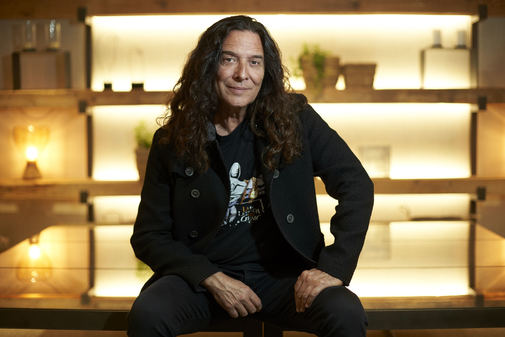- Read all the interviews of the counter
Tomatito Almería, 1958. At the height of his career and with all the awards that a musician can aspire to, the guitarist has just published El Concierto de Aranjuez . So difficult is this work that some said 'don't mess'. He ignored them.
How does one become a flamenco legend? It will be by age, right? Not only for that ... Being in love with what you do and being an organized, disciplined and studious uncle. You have to look to the future and work, without work nothing comes. It has six Grammy Awards, the Max for Performing Arts, the Caesar of France ... I never talk about the awards; but I appreciate them and I appreciate them. The music is far beyond that. It is universal and does not have a language; it is the same for an Andalusian as it does for one in Germany. He started with Camarón at age 16, how do you remember it? Without prejudice and without pressure because at that age the guitar is a toy. You don't think 'hey, I'm playing for the best of all time!' Just play and play. Why was Shrimp so special? He was a genius, on stage the best ever. I was with him from 73 to 92. Was he very shy? Yes, that's why it was worth so much; He spoke little and listened more. People who talk a lot know less. I have it checked. Is it true that he has a picture of Camarón with Paco de Lucía on the cover of his guitar? Yes, of course. The best ones. He also played for Enrique Morente. Yes, it was another phenomenon. He did a lot for flamenco and created a lot of fondness among young people. Camarón liked Enrique very much. And not only flamingos, you have performed with Frank Sinatra and Elton John in their concerts in Spain. Yes, in 93. With Sinatra, I played flamenco and he went with the orchestra led by his son. He was very nice to me because Camarón was just past. He called me, and I played the guitar in his dressing room while smoking a cigar. When Camarón dies, he decides that his career as a backing guitarist is over. I decided that I was going to leave the guitar, but since I like it so much and I'm in love with the instrument, I continued. I had a very bad time, I said "I do not come to this world as a soloist but to touch him". His solo career starts with the tradition, but soon he explores new rhythms. Yes, first with flamenco, and then they proposed to play with Michel Camilo for the Barcelona Jazz Festival. I thought that the piano and the guitar had never married, but we did Kiss me a lot and people ended up applauding. Then we went on a tour to Japan and, on the way back, we made the album Spain , which was a worldwide success. What do you think of those who defend that flamenco should remain pure? Flamenco is a live, moving and root music. The proof is that Paco de Lucía made new chords with which flamenco won and got big. It is a wise music and what is not worth it goes away and does not remain. It has toured all over the world. Istanbul, Moscow, New York, Tokyo, Abu Dhabi ... How is the audience there? Wonderful. It is a culturally educated audience. There they study music since childhood. Here it should be a compulsory subject for children. There are other things that force them to study and are useless. Can you imagine life without music? It would be ugly, with nothing, silence ... Should a good flamenco be a gypsy? No. The gypsies sound different than the payos, but the balance is both. Don Antonio Chacón was not a gypsy, but all the cante for grenadines is his, Paco de Lucía neither was and played better than all the gypsies, all the payos, all the Moors and all the Indians.According to the criteria of The Trust Project
Know more- Almeria
- Andalusia
- Flemish
- music
- Final Interview
The final interview José Antonio García: "The public of 091 is very fan, goes to all the concerts and repeats and repeats"
The final interview Pastora Soler: "Politics? Better music to tame the beasts"
Music and politics The creed, from Girona, of the Child of Elche: "The 'procés' has been a great performance"

